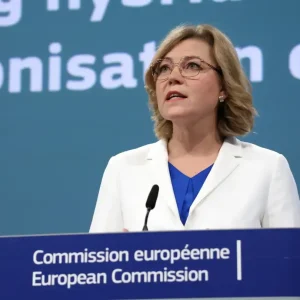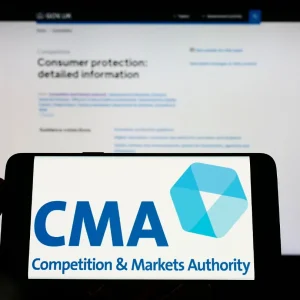
Almost as soon as grainy CCTV images emerged of Russian tanks crossing into Ukraine on 24 February, Big Tech companies began cracking down on Moscow’s behaviour on their platforms. Within days, both Google and Meta cut Russia’s state-run news channels – long viewed as conduits for misinformation – from ad revenue. They also took steps to protect their users in Ukraine: Apple and Google stopped providing live traffic data in their mapping apps, and Meta stepped up its efforts to purge misinformation networks on Facebook and Instagram.
This wasn’t enough for EU member states. By 28 February, Estonia, Lithuania, Poland and Latvia called on Meta, Twitter and Google to suspend Russian state media channels outright on their platforms, while France’s minister for digital policy met with the chief executive of YouTube to discuss how to thwart the spread of ‘Russian propaganda’ throughout Europe. Later that day, after receiving ‘requests from a number of governments and the EU to take further steps,’ Meta’s head of global affairs Nick Clegg announced that the company would be restricting access to RT and Sputnik until further notice.
Questions also emerged about how long major technology platforms should stay in Russia itself. A day after the invasion, Ukraine’s vice prime minister Mykhailo Fedorov called on Apple and other technology giants to stop doing business with Russia. Within a week, Apple had done just that, with its decision to stop all product sales and restrict its services in the country quickly leading to bizarre scenes of commuters on the Moscow Metro, unable to use Apple Pay to clear the barriers, queuing for physical tickets instead. The company was joined by Google, Amazon, TikTok, Microsoft, Spotify, PayPal, Qualcomm and many others, all united by a collective desire to stop making money in an authoritarian regime that had just invaded its sovereign, democratic neighbour.

It seemed less clear if the social media giants would follow suit. While Facebook, Twitter and YouTube certainly profit from the Russian market, they also provided some of the few safe havens for independent media in the country. YouTube in particular had proven a thorn in the side of the Russian state censors, reaching an estimated 106 million users who could, if they so desired, regularly watch videos uploaded by opposition figures like Alexei Navalny. This popularity has, in part, shielded the platform from being blocked. The others were not so fortunate, with Facebook and Twitter condemned by a Russian court as conduits of ‘fake’ news reports and officially banned on 4 March.
These actions have persuaded some that Big Tech has stayed on the right side of history throughout the current crisis. Firms like Meta, Google and Apple “have been remarkably stout in terms of their response to the Russian state,” says Steven Feldstein, a senior fellow at the Carnegie Endowment’s Democracy, Conflict, and Governance Program. “They’ve taken a considerable number of steps beyond what they have done in the past, which I think does represent a fairly important breakthrough moment in terms of how these platforms position themselves.”
This response stands in contrast to Big Tech’s engagement with authoritarian regimes around the world, with whom it typically strikes a delicate balance between censorship and free speech. Big Tech’s firm stance in Russia is unlikely to be replicated in these regimes, experts say – after all, there is a difference between authoritarianism and war crimes. But policymakers and activists may use it as a precedent to further pressure the tech giants to uphold their purported values.
Big Tech in Russia: better the devil you know
Up until this point, Big Tech firms have performed a delicate balancing act when operating in authoritarian nations.
On the one hand, companies such as Meta (formerly Facebook), Twitter and Google were founded on the premise of creating a public square available to anyone on the internet. In authoritarian regimes, however, that space is heavily regulated by targeted censorship, takedown requests, data localisation laws and fines. All of these tools shrink that public square down to a size that the regime deems manageable enough to give users access to the services they love without it becoming a rallying point for political dissidents.
Such was the goal of the Russian authorities. Meta, Apple, Twitter and others were permitted to operate in the country so long as they complied with the state censor’s regular takedown requests and, more recently, laws that compelled the storage of all data on Russian users inside Russia. And, until February this year, that arrangement seemed to work – despite thousands of takedown requests and millions of roubles in fines levied against the big tech giants, the Kremlin tolerated their presence in the country right up until its invasion of Ukraine earlier this year.
The endurance of foreign social media platforms in Russia points towards the fact that, despite being sources of independent media for ordinary citizens, they were – until the invasion – too popular to suppress. While use of Facebook and Google paled in comparison to domestic alternatives like Vkontakte and Yandex, Instagram claimed 80 million users in Russia, while YouTube reached an estimated 106 million. This popularity gave big tech platforms license to push back against certain takedown requests from the state censor, a confidence mirrored in other regimes around the world, like Kazakhstan.
“Typically, these companies comply with only a small number of the takedown requests,” explains Emerson T Brooking, a resident senior fellow at the Digital Forensic Research Lab of the Atlantic Council. As such, “the authoritarian state does not necessarily publicise the platform’s unwillingness to comply, because that would make them look weak”.
Why does Big Tech ever comply with such requests? “When these platforms are making these decisions, they are thinking about their users in these countries who do not represent the government, but who need public spaces,” says Brooking. “It’s actually the same deal with Iran, [which] has banned Instagram multiple times. But Iranians love Instagram, and are still quite active on it.” If Tehran were to block all access to Meta’s services, adds Brooking, it would likely result in a public backlash that would further undermine support for the regime.
Even so, Russia’s example also shows just how effective authoritarian regimes can be in shrinking the public square that Big Tech firms are trying to preserve. While Twitter and Google had a reputation for resisting censorship in Russia, it seemed by the invasion that they were fighting a losing battle, with the former removing some 6,000 posts and the latter succumbing to a huge fine for non-compliance.
Withdrawing from a country in the face of such pressure, however, can be disastrous for free speech. Since Facebook was blocked by a Russian court earlier this month, “we’ve seen an uptick in Russians using VKontakte,” says Brooking. “But VKontakte was acquired by the Russian state entity Gazprom in December of last year. It’s now essentially a state-run social network that’s completely compliant to state demands.”

Foreign contexts
Big Tech platforms have negotiated this balance between remaining compliant and enabling free speech in authoritarian regimes around the world. But their response to Russia’s war in Ukraine implies a firmer stance.
This may not be replicated elsewhere. After all, while the sector has been resolute in response to Russian aggression, it reflects a profound and unique sense of horror felt by millions of users at the scenes of terror and destruction in Ukraine broadcast for a month now across most Western news channels.
As such, says Natasha Lamb, technology firms face enormous brand risks in continuing to work with or inside Russia specifically. The situation is now comparable to the divestment movement against South Africa in the late 1980s, explains the managing partner at ESG firm Arjuna Capital: “Apartheid stood in stark contrast to modern international norms, as does Russia’s authoritarian invasion of a democratic, sovereign Ukraine.”
Lamb is hopeful that the tech giants’ dealings in authoritarian countries will assume greater prominence among ESG investors after the Ukraine crisis. But Feldstein doubts whether the same stance against censorship and repression will be adopted against US allies.
“Let’s say that Crown Prince Mohammed bin Salman sends a hit squad to assassinate another dissident,” says Feldstein. “Will that mean that the Saudi government’s propaganda outlets are prohibited from operating on Facebook? It’s hard to say.”
Similarly, Turkey – a semi-authoritarian member of NATO – has been aggressive in blocking platforms hosting content deemed offensive by the ruling AKP government, including Wikipedia. Like Moscow, Ankara has also passed data localisation laws with which, for the most part, foreign Big Tech firms have complied. India’s government, too, has been criticised for pressuring social media platforms to take down posts supporting mass protests by farmers and criticising the government’s conduct during the pandemic.
A public backlash against Big Tech’s dealings in these countries, comparable to the response to the Ukraine crisis, seems improbable. More likely is a change in how social media giants approach content moderation in times of war. Increasingly, says Brooking, “there’s an understanding that not all of the policies that make sense in peace can be applied”.
It was for this reason that Meta recently announced that it was permitting calls for violence against Russian military personnel inside Ukraine (a reversal of sorts from the position of Facebook’s Oversight Board on ‘dehumanizing slurs’ posted by users from Armenia during its recent war with Azerbaijan.) Twitter’s traditional policy of allowing authoritarian regimes to maintain official accounts on its platform – including the Supreme Leader of Iran and spokespersons from the Taliban – has also been strained by the activities of the Russian foreign ministry, whose embassies have regularly published disinformation on the Ukrainian conflict. Even so, this newfound flexibility has prompted accusations of double standards, with some questioning Facebook why the language of violence was permitted against Russian military personnel in Ukraine and not members of the Israeli Defence Forces in the Palestinian territories.
All these complicating factors reinforce the impression that, in many ways, Russia’s invasion of Ukraine was a unique event for big tech. “I think there’s still going to be a high bar when it comes to companies being willing to take actions in other contexts,” says Feldstein. “Just because a country is authoritarian and it commits a certain level of human rights abuses doesn’t mean that its behaviour is equivalent to what Russia is doing, which is war crimes.”
Simultaneously, the example set by these platforms in the current crisis is certain to be cited by pro-democracy and human rights activists around the world. They’ll likely be joined by Western nations that see Big Tech firms as conduits for their own foreign policy toward authoritarian regimes.
“We have regulations that are coming online, like the EU Digital Services Act, which will further push platforms to make tough decisions when it comes to how they moderate hate speech and other types of inflammatory content,” says Feldstein.
This makes conflict between Big Tech platforms and authoritarian regimes over free speech online all the more likely. “That’s a necessary part of what it means to have an online forum for three billion people around the world,” says Feldstein. “It’s a long time coming. It’s going to be hard, but this is an issue that platforms have to figure out.”






